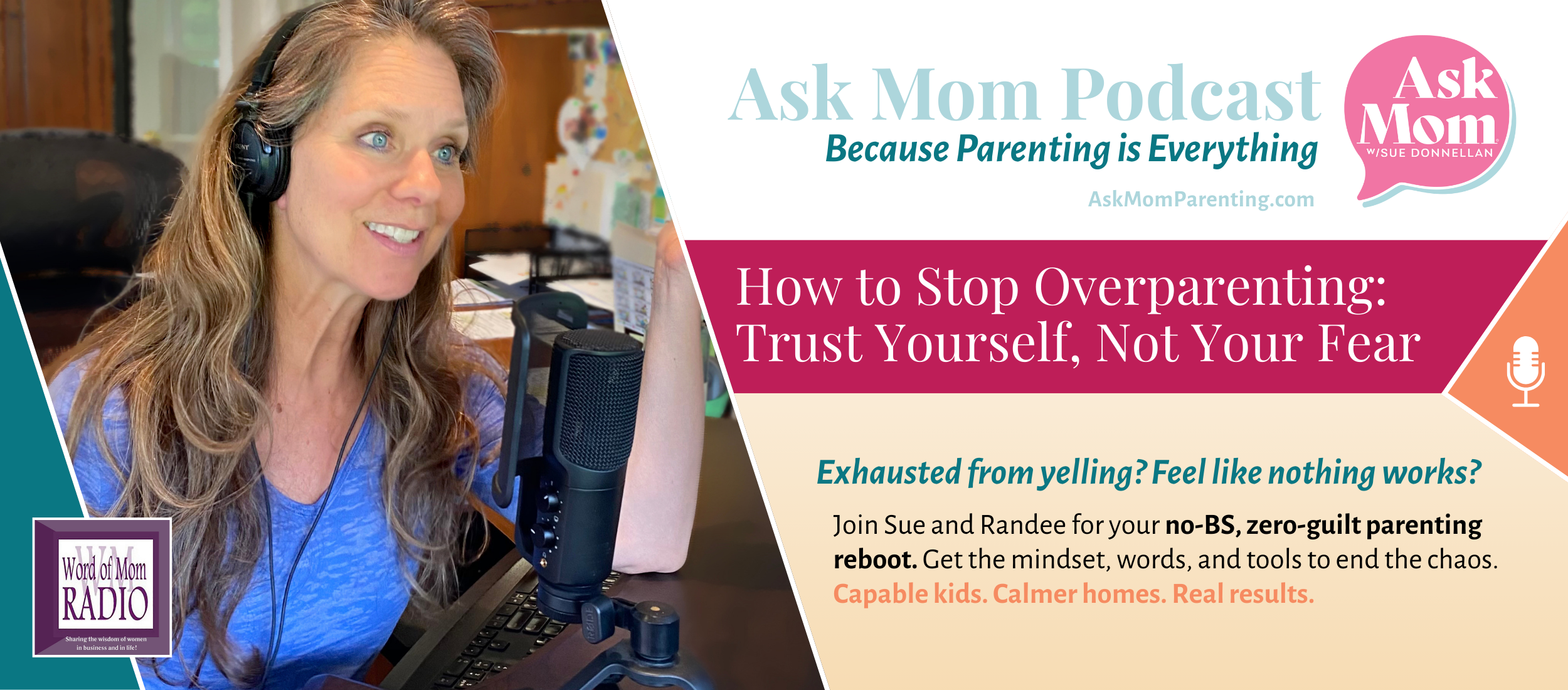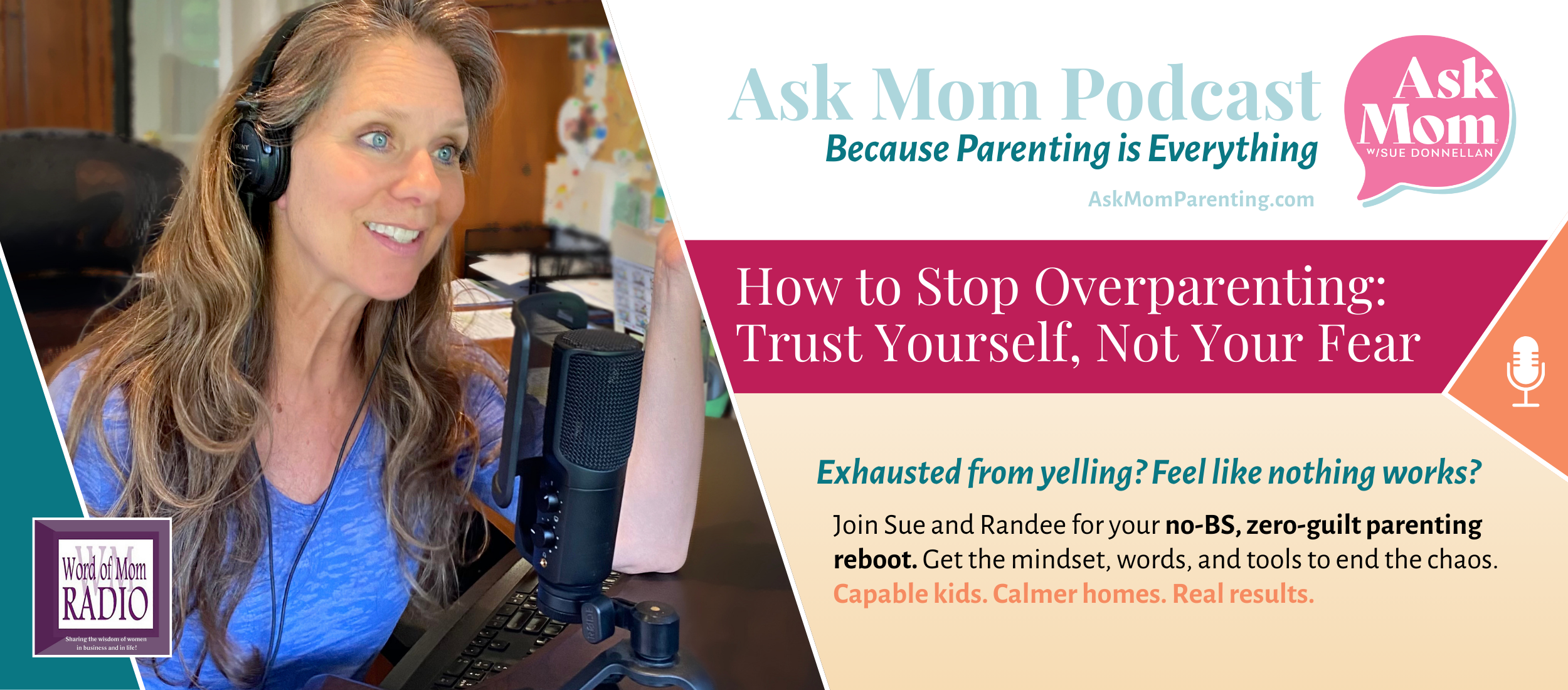Am I Helping or Hovering?: A Question That Will Change Your Parenting

Parenting is a journey filled with love, joy, and countless decisions. We all want to do what’s best for our children, but sometimes, our desire to protect and guide them can inadvertently lead us down a path of over-involvement. In this blog post, we'll delve into a pivotal question that can transform your parenting approach: "Am I helping or hovering?" Learning to discern the difference between these two approaches is crucial for fostering independence, resilience, and confidence in your children. This topic was discussed in depth in the latest episode of the Ask Mom Parenting podcast with Sue Donnellan, where we explored the subtle ways control manifests in "good parenting" and how it can ultimately backfire. We'll explore the core concepts discussed in the episode and offer actionable steps to help you strike the right balance.
The Pivotal Question That Will Change Your Parenting
At the heart of effective parenting lies the ability to discern whether our actions are truly supporting our children's growth or hindering it. This is where the question "Am I helping or hovering?" becomes incredibly powerful. It's a simple yet profound inquiry that forces us to examine our motivations and the potential impact of our interventions. When we're helping, we're providing guidance, support, and resources that empower our children to navigate challenges and learn from their experiences. When we're hovering, we're essentially taking over, preventing them from developing the skills and confidence they need to thrive. The difference lies in the intention and the outcome. Are we trying to make things easier for our children in the short term, or are we equipping them to handle challenges independently in the long run?
The Sneaky Ways Control Hides in “Good Parenting”
Control in parenting doesn’t always manifest as overt authoritarianism. Often, it’s disguised as “good parenting,” making it all the more insidious. Micromanaging homework, excessively monitoring social media, and orchestrating every aspect of their lives are all subtle forms of control. These behaviors, while often well-intentioned, communicate a lack of trust in the child's abilities and judgment. It's essential to recognize these patterns and understand that true parenting involves guiding and supporting, not dictating. Reflect on your own parenting style. Do you find yourself constantly correcting your child's actions, redoing their tasks, or making decisions for them without their input? If so, it's time to examine the underlying reasons for your behavior. Are you driven by a fear of failure, a desire to protect them from discomfort, or a need to feel in control? Identifying these motivations is the first step towards breaking free from the cycle of overparenting.
Micromanaging: Robbing Your Kids of Confidence (and You of Sanity)
Micromanaging is a surefire way to erode a child's confidence and create unnecessary stress for both parent and child. When parents constantly oversee and control every detail of their child's life, they send the message that they don't trust them to make good decisions or handle challenges on their own. This can lead to feelings of inadequacy, anxiety, and a lack of self-belief. Moreover, micromanaging is exhausting. It requires an immense amount of energy and attention to detail, leaving parents feeling overwhelmed and burnt out. Instead of micromanaging, focus on providing guidance and support while allowing your child the space to experiment, make mistakes, and learn from their experiences. This will not only foster their independence but also free up your time and energy to focus on other aspects of your life.
Fear: The Fuel Behind Overparenting
At the root of overparenting often lies fear. Fear of failure, fear of disappointment, fear of danger – these anxieties can drive parents to excessively control their children's lives in an attempt to protect them from harm. While it's natural to want to shield our children from pain, it's important to recognize that experiencing challenges and setbacks is a crucial part of growth and development. By constantly intervening and preventing our children from facing difficulties, we rob them of the opportunity to develop resilience, problem-solving skills, and a sense of self-efficacy. To overcome fear-based overparenting, it's essential to confront our own anxieties and recognize that our children are capable of handling more than we might think. Trust their abilities, provide them with a safe and supportive environment, and allow them to learn from their mistakes. Remember, failure is not the opposite of success; it's a stepping stone towards it.
Structure, Not a Script: Autonomy Within Boundaries
Providing structure is essential for children's development, but it's crucial to distinguish between structure and a rigid script. Structure provides a framework within which children can exercise their autonomy and make their own choices. A script, on the other hand, dictates every aspect of their lives, leaving them little room for independent thought or action. To create a healthy balance, establish clear boundaries and expectations, but allow your child to have a say in how they are met. For example, you might set a bedtime for your child, but allow them to choose what they read or what activities they engage in before bed. Similarly, you might require them to complete their homework, but allow them to choose when and where they do it. By providing structure without stifling autonomy, you can help your child develop a sense of responsibility, independence, and self-direction.
The Rebellious (or People-Pleasing) Result of Overcontrol
Overcontrolling parenting can have a variety of negative consequences for children. Some children may rebel against the excessive control, becoming defiant, secretive, or engaging in risky behaviors. Others may become people-pleasers, constantly seeking approval from others and suppressing their own needs and desires. Both of these outcomes are detrimental to a child's well-being and can lead to long-term emotional and psychological problems. To avoid these pitfalls, it's essential to create a parenting style that is based on trust, respect, and open communication. Encourage your child to express their thoughts and feelings, validate their experiences, and provide them with the space to make their own decisions and learn from their mistakes. Remember, the goal is to raise independent, resilient, and well-adjusted individuals, not to control their every move.
Decision-Making Skills: What You Might Be Preventing
One of the most important skills that children need to develop is the ability to make sound decisions. However, overparenting can inadvertently prevent children from developing this crucial skill. When parents constantly make decisions for their children, they deprive them of the opportunity to weigh options, consider consequences, and learn from their choices. To foster decision-making skills, start by involving your child in age-appropriate decisions. Allow them to choose their clothes, select their meals, or decide how to spend their free time. As they get older, gradually increase the complexity of the decisions they are allowed to make. Provide them with information and guidance, but ultimately, let them make the final call. When they make mistakes, use it as an opportunity to teach them about problem-solving and learning from experience.
The Tightrope: Encouragement vs. Control
Parenting is often a delicate balancing act, and the line between encouragement and control can be particularly тонкая. Encouragement involves providing support, motivation, and positive reinforcement to help children achieve their goals. Control, on the other hand, involves dictating their actions, imposing our will, and stifling their autonomy. To walk the tightrope between encouragement and control, focus on empowering your child rather than directing them. Encourage them to pursue their interests, explore their talents, and set their own goals. Provide them with the resources and support they need to succeed, but avoid imposing your own expectations or desires on them. Celebrate their successes, but also help them learn from their failures. Remember, the goal is to help them become the best version of themselves, not a replica of you.
The Parenting Question That Will Change Your Day: "Am I Helping or Hovering?"
The question "Am I helping or hovering?" is not just a theoretical exercise; it's a practical tool that can be used in everyday parenting situations. Before intervening in your child's activities, pause and ask yourself this question. Are you truly helping them, or are you simply hovering and preventing them from learning and growing? If you're not sure, err on the side of caution and allow them to try on their own. You can always offer assistance later if they genuinely need it. By consistently asking yourself this question, you can become more aware of your own parenting tendencies and make conscious choices that support your child's independence and resilience.
Listener Challenge: Loosen Your Grip
As discussed in the podcast episode, it's time for a challenge! Pick one area where you're over-involved in your child's life. Is it their homework, their chores, their social life? Choose one aspect where you tend to micromanage or take over, and consciously loosen your grip. Let your child take the reins, even if it means they make mistakes or do things differently than you would. Observe what happens and resist the urge to intervene unless they specifically ask for your help. You might be surprised at their capabilities and resilience. This exercise is not only beneficial for your child but also for you. It can help you reduce stress, build trust, and foster a healthier relationship with your child.
Raise a Problem-Solver, Not a Puppet
Ultimately, our goal as parents is to raise independent, resilient, and well-adjusted individuals who are capable of solving problems and navigating life's challenges. By avoiding overparenting and fostering autonomy, we can empower our children to develop these essential skills. Remember, our role is not to control their every move or shield them from all discomfort, but to provide them with the support, guidance, and resources they need to thrive. As Sue says in the Stop Overparenting on Ask Mom Parenting episode "When we prevent our kids’ discomfort, we also prevent their growth. You want to raise a problem-solver, not a puppet." By embracing this philosophy, we can help our children become confident, capable, and successful individuals who are ready to take on the world.




